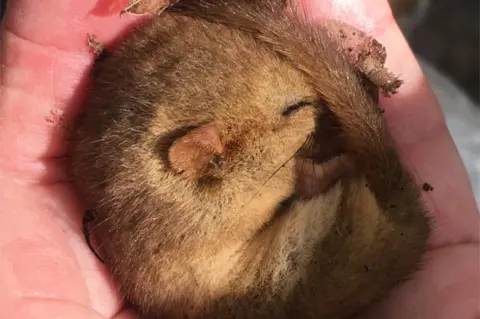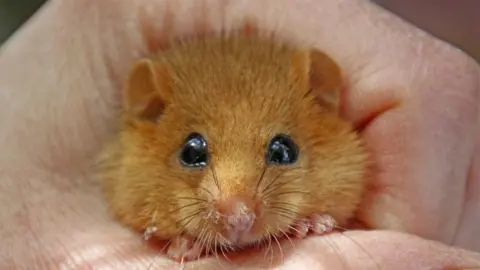Endangered dormice breeding in Hove nature reserve
 Benfield Wildlife and Conservation Group
Benfield Wildlife and Conservation GroupA colony of a species of dormouse which is facing extinction has been found breeding in Hove, conservationists say.
The colony of hazel dormice has been found in dense woodland in the Benfield Hill nature reserve.
Volunteers check nesting boxes in the woods every month with any dormice found being weighed before being put back.
Climate change and habitat loss have been cited as the main reasons for their decline.
Experts say the population of hazel dormice has halved since 2000 and it is now a protected species.
Sally Wadsworth, chair of the Benfield Wildlife and Conservation Group, said: "We've got some dense woodland and we've also got a lot of different varieties of bushes - brambles and hawthorns - and we've planted new trees to improve the biodiversity on the site.
"All along the Brighton bypass there are colonies of dormice."
 Wildwood Trust
Wildwood TrustHazel Ryan, from the Wildwood Trust in Kent, says the dormice population has been hit by a loss of hedgerows and woodland, as well as climate change.
She said their habitats had been fragmented by the building of roads and housing developments.
"They rely on nice warm, dry summers when they can go foraging for food, and nice cold winters when they can hibernate. We're beginning to get warmer winters and wetter, windier summers."
Peter Hubbard, a volunteer at Benfield Hill, said: "We checked the boxes from April onwards, and we found some pregnant females with some littles ones. We just hope they're going to survive."
Monitoring will continue at the reserve and across other breeding sites across the South East until the dormice go into hibernation.

Follow BBC South East on Facebook, on Twitter, and on Instagram. Send your story ideas to [email protected].
